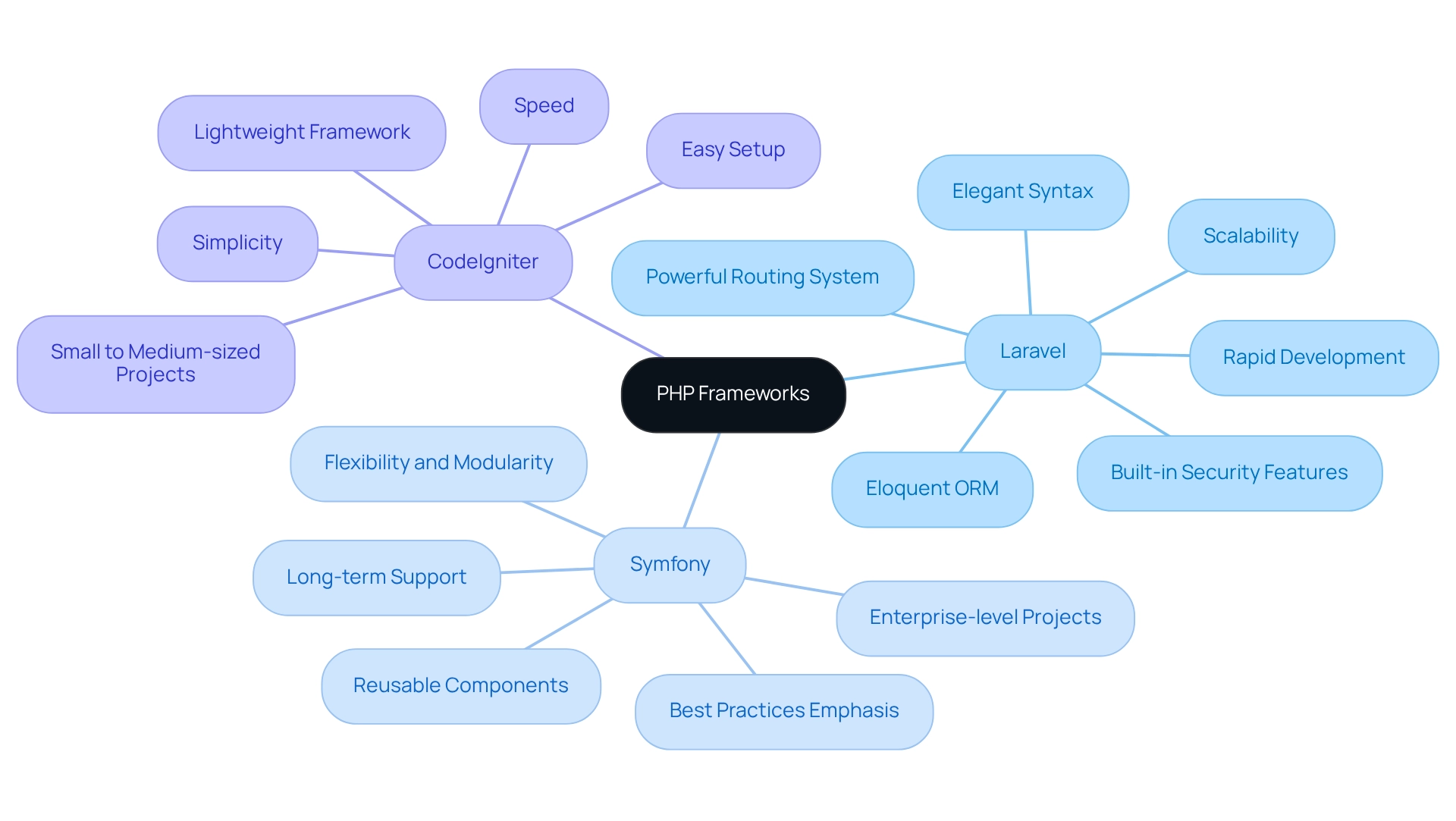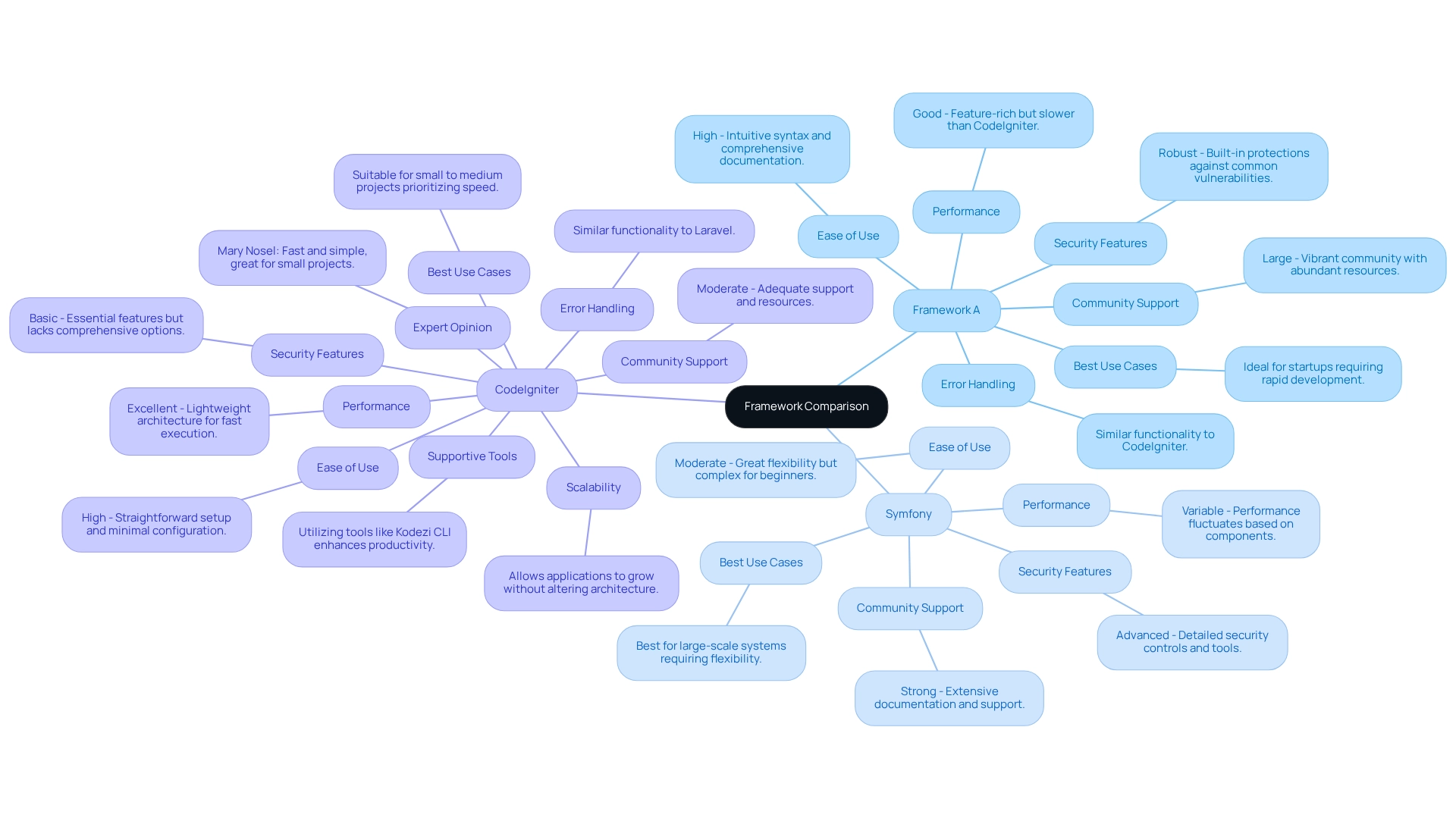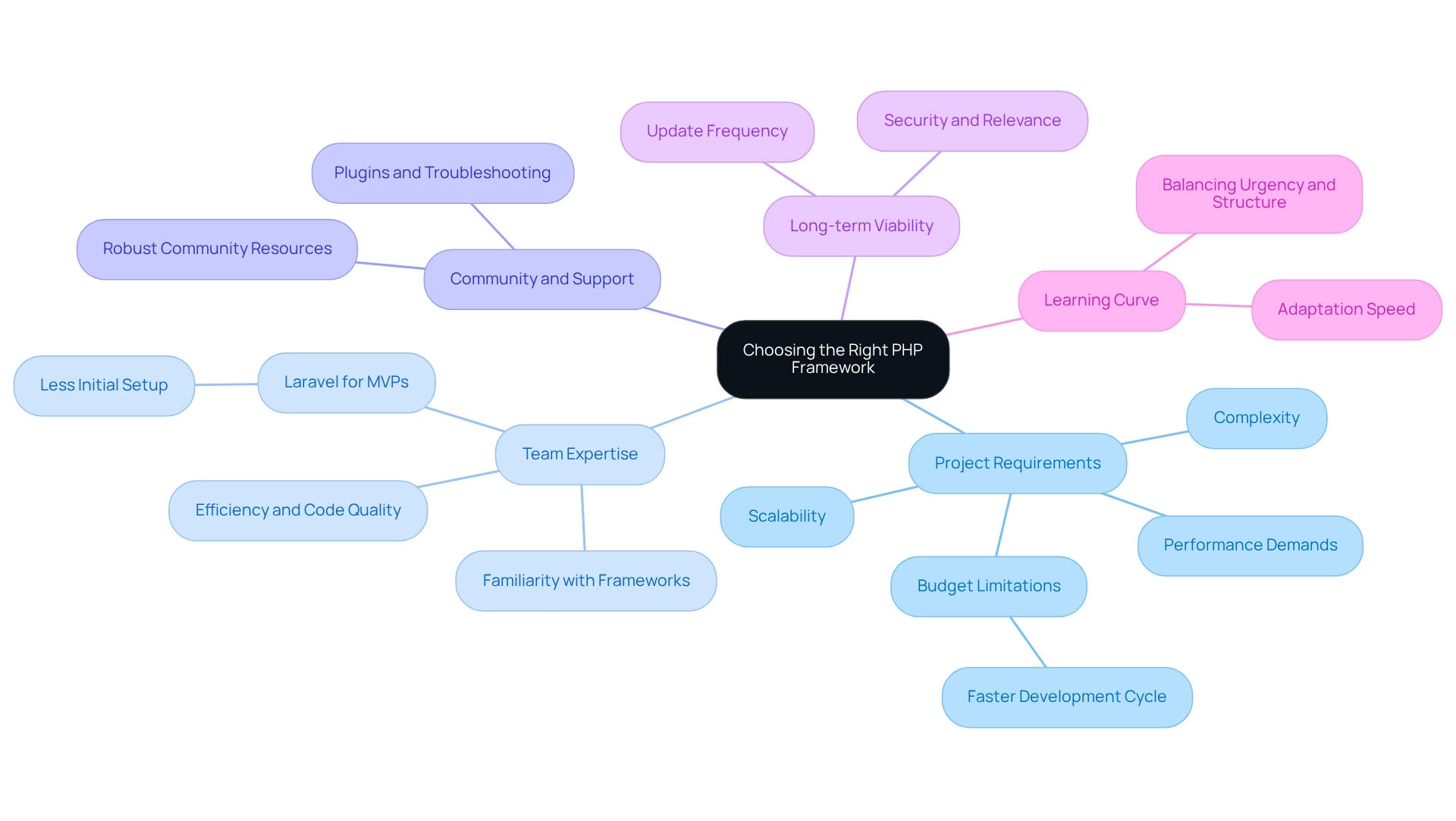Overview
PHP frameworks are essential in web development, addressing common coding challenges by providing pre-built libraries and tools that streamline the development process. They enforce best practices, such as the MVC architecture, and enhance security. Notably, popular frameworks like Laravel, Symfony, and CodeIgniter offer unique features tailored to specific use cases. This variety helps developers select the appropriate framework based on project requirements, team expertise, and community support.
Furthermore, the strengths of these frameworks enable developers to improve productivity and code quality. For instance, Laravel's elegant syntax and robust features make it ideal for building modern web applications. In addition, Symfony's flexibility and scalability cater to large enterprise projects, while CodeIgniter's simplicity is perfect for smaller applications.
Have you considered how the right framework can impact your development process? By leveraging these frameworks, developers can enhance their workflows and achieve better results. Exploring the unique offerings of each framework will empower you to make informed decisions that align with your project goals.
In conclusion, the adoption of PHP frameworks not only simplifies development but also fosters best practices and security. Engaging with the community and understanding the specific advantages of each framework can significantly elevate your coding experience.
Introduction
In the dynamic realm of web development, developers often encounter significant challenges that can hinder efficiency and security. PHP frameworks have emerged as vital allies in addressing these issues, offering a range of pre-built libraries and tools that streamline the development process. Frameworks like Laravel, Symfony, and CodeIgniter not only facilitate rapid development but also enforce best practices, such as the Model-View-Controller architecture, ensuring that applications are robust and maintainable.
As the demand for sophisticated web applications continues to rise, understanding the unique features, advantages, and limitations of these frameworks is essential. This article explores the crucial role PHP frameworks play in modern development, comparing leading options and providing insights into the factors influencing the selection of the right framework for various projects.
Whether you aim for swift deployment or are tackling complex applications, choosing the right framework can significantly impact your success in the digital landscape.
Define PHP Frameworks and Their Role in Web Development
PHP frameworks for web development are essential collections of pre-built libraries and tools that facilitate the creation of web projects using the PHP programming language. They establish an organized environment that encourages best practices, particularly the Model-View-Controller (MVC) architecture, which effectively separates program logic from user interface concerns. By leveraging a PHP framework, developers can significantly reduce repetitive coding tasks, thereby speeding up the development process and improving code maintainability.
Furthermore, many frameworks come equipped with integrated security features that safeguard software against common vulnerabilities. As Paridhi Wadhwani points out, "Laravel comes with built-in security features, such as protection against SQL injection, cross-site scripting, and cross-site request forgery, ensuring your business applications are secure from common vulnerabilities." This underscores the vital role that PHP frameworks for web development play in contemporary projects.
In fact, as of 2025, over 60% of developers report utilizing PHP frameworks for web development, reflecting their significance in the industry. The competitive landscape of PHP frameworks for web development, including major players like Symfony and CodeIgniter, continually drives innovation, ensuring these tools evolve to meet the changing needs of developers and businesses alike. The PHP framework market is highly competitive, with established entities innovating to address the dynamic demands of programmers and organizations, as highlighted in the case study on the competitive landscape of PHP frameworks.
Overview of Laravel, Symfony, and CodeIgniter
- This framework is known for its elegant syntax and robust features, making it one of the top PHP frameworks for web development, ideal for developers who appreciate a modern approach. It offers a rich set of functionalities, including Eloquent ORM for database interactions, a powerful routing system, and built-in security features. Laravel is particularly favored as one of the PHP frameworks for web development for projects requiring rapid development and scalability.
- Symfony is recognized for its flexibility and modularity, which makes it one of the top PHP frameworks for web development suitable for complex applications. It provides a comprehensive set of reusable components and is often used in enterprise-level projects. With its emphasis on best practices and long-term support, Symfony is a preferred choice among PHP frameworks for web development, particularly for large-scale applications.
- CodeIgniter is one of the notable PHP frameworks for web development due to its simplicity and speed; it is a lightweight framework that is easy to set up and use. This makes it perfect for programmers seeking a straightforward solution without the burden of more complex frameworks. CodeIgniter is particularly well-suited for small to medium-sized projects where performance is a priority.

Compare Key Features, Pros, and Cons of Each Framework
Feature/Aspect | Framework A | Symfony | CodeIgniter
----------------|---------|---------|-------------
Ease of Use | High - With its intuitive syntax and comprehensive documentation, Framework A is particularly beginner-friendly, making it a popular choice for new developers. | Moderate - While Symfony offers great flexibility, its complexity and configuration requirements can pose a challenge for beginners. | High - CodeIgniter stands out for its straightforward setup and minimal configuration, appealing to those seeking simplicity.
Performance | Good - Although the framework is feature-rich, it is somewhat slower than CodeIgniter, which may affect performance in resource-intensive projects. | Variable - Symfony's performance can fluctuate significantly based on the selected components and their configurations, requiring careful planning. | Excellent - Known for its lightweight architecture, CodeIgniter delivers fast execution, making it ideal for performance-sensitive applications.
Community Support | Large - Laravel features a vibrant community, offering an abundance of resources, packages, and forums for programmers to utilize. | Strong - Symfony's well-established community provides extensive documentation and support, ensuring programmers have access to necessary resources. | Moderate - While CodeIgniter has a smaller community, it still provides adequate support and resources for developers.
Security Features | Robust - The framework includes built-in protections against common vulnerabilities, making it a secure choice for web solutions. | Advanced - Symfony provides detailed security controls and tools, designed for systems that demand stringent security measures. | Basic - CodeIgniter provides essential security features, but it lacks the comprehensive security options found in Laravel and Symfony.
Best Use Cases | Ideal for startups and projects that require rapid development cycles, especially when utilizing PHP frameworks for web development, allowing for quick iterations and deployment. | Best suited for large-scale systems that require flexibility and long-term support, making it a favorite among enterprise developers. | Suitable for small to medium projects that prioritize speed and simplicity, particularly when rapid deployment is essential.
Error Handling | Similar functionality to CodeIgniter, providing effective error management. | | |
Scalability | | | CodeIgniter allows applications to grow in traffic and performance without altering their architecture, ensuring both extensibility and scalability.
Expert Opinion | | | Mary Nosel observes that CodeIgniter is quick and straightforward, ideal for smaller projects, but lacks sophisticated capabilities present in other systems.
Supportive Tools | Utilizing supportive tools like Kodezi CLI can significantly enhance programmer productivity by automating code debugging and performance optimization. Kodezi CLI's auto-healing features guarantee that codebases stay strong and safe, rendering it an essential resource for developers utilizing any of these structures. | | |

Determine Factors for Choosing the Right PHP Framework
Selecting the appropriate PHP framework can be a significant challenge for developers, requiring careful consideration of several key factors:
- Project Requirements: Evaluating the specific needs of your project is essential. Consider aspects such as scalability, complexity, and performance demands. PHP frameworks for web development that offer swift development features are often preferred for projects with strict timelines. Additionally, budget limitations can benefit from a framework's quicker development process, enabling teams to complete projects more effectively.
- Team Expertise: The skill set of your development team plays a crucial role. Familiarity with a specific framework can simplify the development process, enhancing both efficiency and code quality. For instance, teams experienced in PHP frameworks for web development such as Laravel may find its productive environment particularly beneficial for building MVPs and functional applications with minimal setup.
- Community and Support: A robust community is invaluable, providing resources, plugins, and support that are essential for troubleshooting and extending functionality. PHP frameworks for web development with active communities tend to offer more readily available solutions to common challenges.
- Long-term Viability: Evaluating the system's update frequency and long-term support options is crucial to ensure it remains secure and relevant. PHP frameworks for web development that prioritize regular updates can help mitigate security risks and adapt to evolving technology trends.
- Learning Curve: Understanding how quickly your team can adapt to a new framework is essential. While a steeper learning curve may initially extend development timelines, it can lead to more robust features and capabilities in the long run. In 2025, developers increasingly recognize the importance of balancing urgent project requirements with long-term structural advantages.
A recent analysis indicated that 13% of PHP programmers favor Pest as a testing tool, underscoring the variety of resources available within the PHP ecosystem. Moreover, case studies, such as "Impact of PHP Tools on Web Development," demonstrate that PHP tools significantly enhance security, efficiency, and maintainability, empowering programmers to build high-quality web applications successfully. As developers share their experiences within the community, insights into the factors influencing framework selection continue to evolve, guiding others in making informed decisions.

Conclusion
The exploration of PHP frameworks underscores their vital role in modern web development, acting as powerful tools that enhance efficiency, security, and maintainability. These frameworks, including Laravel, Symfony, and CodeIgniter, provide a structured environment and promote best practices, enabling developers to tackle common challenges, streamline workflows, and create robust applications. Each framework presents unique features tailored to various project needs—ranging from Laravel's rapid development capabilities to Symfony's flexibility for complex applications and CodeIgniter's simplicity for smaller projects.
Choosing the right PHP framework is crucial and should be guided by factors such as:
- Project requirements
- Team expertise
- Community support
- Long-term viability
- The learning curve
By understanding these elements, developers can make informed decisions that align with their goals and resources. As PHP frameworks continue to evolve within a competitive landscape, they remain essential allies for developers striving to deliver high-quality web applications in an ever-changing digital environment.
Ultimately, the choice of framework can significantly influence the success of a project, highlighting the importance of thorough evaluation and strategic planning. Embracing the right PHP framework not only accelerates the development process but also fosters innovation and adaptability, paving the way for future advancements in web development.
Frequently Asked Questions
What are PHP frameworks and why are they important for web development?
PHP frameworks are essential collections of pre-built libraries and tools that facilitate the creation of web projects using the PHP programming language. They provide an organized environment that encourages best practices, particularly the Model-View-Controller (MVC) architecture, which separates program logic from user interface concerns.
How do PHP frameworks benefit developers?
By leveraging a PHP framework, developers can significantly reduce repetitive coding tasks, speeding up the development process and improving code maintainability.
What security features do PHP frameworks typically offer?
Many PHP frameworks come with integrated security features that protect against common vulnerabilities, such as SQL injection, cross-site scripting, and cross-site request forgery.
What is the significance of PHP frameworks in the developer community?
As of 2025, over 60% of developers report utilizing PHP frameworks for web development, highlighting their significance in the industry.
Who are the major players in the PHP framework market?
Major players in the PHP framework market include Symfony and CodeIgniter, which continually drive innovation to meet the changing needs of developers and businesses.
How does the competitive landscape affect PHP frameworks?
The competitive landscape of PHP frameworks is highly dynamic, with established entities innovating to address the evolving demands of programmers and organizations.




